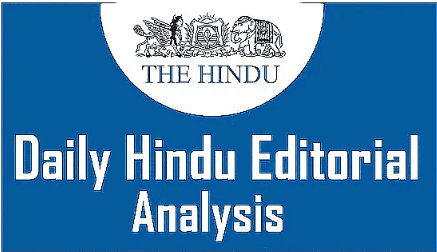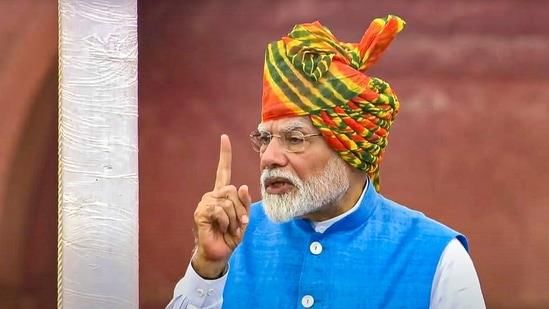The Hindu Editorial Analysis- 16th August 2024 | Current Affairs & Hindu Analysis: Daily, Weekly & Monthly - UPSC PDF Download

Reshape the Governance Structures of AI Companies
Why in News?
The way modern companies are run in capitalist and neo-capitalist economies typically focuses on putting shareholders first. This means that making profits and increasing wealth for shareholders and investors is the main goal, more important than other goals like benefiting the public.
- On the other hand, some people support a different approach called stakeholder benefit. This way of running a company aims to maximize the advantages for all involved parties.
Potential of AI in India
- National Strategy For AI: A recent report by PwC mentioned that AI could add around $15.7 trillion to the global economy by 2030. To tap into this opportunity, the government introduced the National Strategy for Artificial Intelligence (NSAI) in June 2018. This strategy acts as a guide for the government to use AI for better service delivery, collaborate with the private sector, and build capabilities to innovate.
- Deregulation of Geospatial Sector: The government has recently opened up the geospatial sector for private players to introduce advanced solutions, fostering innovation in AI-driven mapping and analytics. This move in India could revolutionize sectors like infrastructure, healthcare, and urban planning for climate resilience.
- Geospatial: Geospatial information simply refers to location-based data tied to maps. It involves geography and mapping represented visually.
- Reducing Energy Losses: AI holds promise in the energy sector by enabling renewable energy producers and distribution companies to predict grid load management better, thereby reducing losses and improving efficiency. This could make renewable energy adoption more cost-effective, especially in places like Delhi and Kolkata where substantial revenue losses occur annually.
- Increased Governance: Through AI, the Power Ministry's Renewable Energy Management Centres (REMCs) can enhance their capabilities in forecasting, scheduling, and monitoring renewable energy. This is achieved by analyzing historical weather data, energy generation patterns, and regional electricity demands.
- AI solutions to Emerging Trends: Embracing AI for digital transformation enables governments to swiftly respond to emerging trends. Policymakers are exploring AI applications for improved tax monitoring and data compliance within the government framework.
Challenges With Wide Use of AI
- Comprising Privacy: AI systems learn by analyzing vast amounts of data and adapt continuously by studying how users interact with them.
- Thus, as AI usage increases, the right to privacy might be at risk due to unauthorized access to one's activity information.
- Disproportionate Power and Control: Big technology companies are heavily investing in artificial intelligence, both in research and development, as well as in commercial applications.
- These major players have a significant advantage over smaller competitors, reflecting a society dominated by data.
- Technological Unemployment: AI firms are creating smart machines that can perform tasks traditionally done by low-wage workers.
- For instance, automated kiosks replacing human cashiers and robots being used in agriculture to replace manual labor.
- Additionally, AI could lead to the displacement of certain office jobs like accounting, financial trading, and middle management roles.
- Exacerbating Inequalities: Through AI implementation, businesses can reduce their reliance on human labor, concentrating wealth among a select few.
- This trend means that profits will be concentrated among those who own shares in AI-driven enterprises, potentially widening the gap between the digitally included and excluded.
Way Forward
- Need For Sensitisation and Capacity-building: In the realm of public sector adoption of AI, it's crucial to raise awareness and enhance skills within the government.
- Create Enabling Ecosystem: We should establish supportive environments in schools using diverse approaches with AI as a central focus to empower the next generation in developing practical AI solutions for India.
- Public-Private Partnerships (PPPs): A recent initiative, Future Skills Prime, has demonstrated the power of collaborations between the public and private sectors by offering courses to various groups, including citizens, government personnel, and businesses.
- Uniform Standard Rules: Setting standardized regulations will help grow markets for beneficial AI products and services.
- Collaborate Every Stakeholder: As AI increasingly influences our daily lives, it's crucial for all parties—innovators, policymakers, educators, industry professionals, charitable organizations, international organizations, and civil society—to work together to guide AI's future toward positive goals.
- Need Ethics in AI: There's a necessity for worldwide cooperation to ensure AI is utilized in a manner that is reliable, respects human rights, is safe and sustainable, and promotes peace.
Conclusion
- The different groups involved must work together to ensure that AI is used for good purposes.
- India, with its advanced technology and large amount of data, can take the lead in successfully utilizing AI solutions, which will help in overall development and empowerment of society.
Freedom Notes
Why in News?
P rime Minister Narendra Modi’s first Independence Day speech in his third term in office — the eleventh since 2014 — sought to signal continuity and authority, particularly in the context of the fact that he is now leading a coalition government. He called for a uniform civil code, terming it a secular measure agnostic of religious faiths, ‘one nation, one election,’ and increased safety of women against the backdrop of the sexual assault and murder of an on-duty doctor in Kolkata recently. Mr. Modi said there were attempts to destabilise the economy of the country, echoing the BJP’s view on a recent report by U.S.-based short seller Hindenburg Research that has accused the head of stock market regulator SEBI of conflict of interest.

Here are the main takeaways from his address:
Vision for a Developed India by 2047PM Modi underscored the theme of this year's Independence Day, "Viksit Bharat 2047," emphasizing that it represents the collective aspirations and determination of 1.4 billion Indians. He called on every citizen to contribute towards realizing this vision of a developed and prosperous India by the centenary of its independence.
Reforming Key Sectors
Highlighting significant reforms, Modi praised the government's efforts to revamp critical areas such as banking, education, and criminal justice. He emphasized the ongoing modernization of these sectors as crucial to India's growth and development.
Promotion of 'Secular Civil Code'
Addressing the need for a more inclusive legal framework, PM Modi advocated for the implementation of a secular civil code. He stressed that such a code would replace the existing communal civil code, ensuring fairness and equality for all citizens.
Safety for Women
In light of the widespread protests following the tragic murder and rape of an on-duty doctor in Kolkata, PM Modi emphasized the importance of publicizing the punishments for crimes against women. "The need of the hour is to widely publicize the punishment for atrocities against women to instill a fear of consequences," PM Modi asserted in his Independence Day 2024 address on Thursday.
Global Promotion of Ayurveda
In line with promoting traditional knowledge and medicine, the Prime Minister highlighted the global promotion of Ayurveda. This initiative aims to position India as a leader in alternative medicine, showcasing the benefits of Ayurveda to the world.
Expansion of Medical Education
Recognizing the challenges faced by medical students in India, PM Modi announced the addition of 75,000 new medical seats over the next five years. This initiative aims to alleviate the need for students to study abroad and reduce the financial burden on middle-class families.
Strengthening Disaster Preparedness
Acknowledging the importance of disaster management, PM Modi outlined plans to enhance the country's capacity to handle natural calamities. This initiative aims to improve resilience and response strategies for better protection of communities.
Empowerment of Women and Rural Initiatives
The Prime Minister highlighted the empowerment of "lakhpati didis," women from self-help groups who have achieved significant economic success. This initiative showcases the government's commitment to women's empowerment and rural development, providing them with the tools and opportunities to thrive.
Achievements in Armed Forces and Banking Reforms
The Prime Minister took pride in the accomplishments of India's armed forces, particularly in surgical and air strikes, which have bolstered national pride. He also highlighted significant reforms in the banking sector that have strengthened financial stability and supported economic growth.
Promoting the Space Sector
Prime Minister Modi highlighted the rapid advancements in India's space sector, emphasizing the significant role played by private companies and startups in satellite and rocket launches. He noted, "The space sector has become a major focus area with numerous reforms underway. Today, we see many startups making their mark in this field," underlining the government's efforts to nurture innovation and expand opportunities in space exploration.
Enhancing Quality of Life for the Middle Class
Addressing the needs and expectations of the middle class, Modi reaffirmed his government's dedication to improving living standards and cutting through bureaucratic red tape. "We are committed to elevating the quality of life for the middle class and removing unnecessary obstacles," he stated, stressing the administration's focus on making everyday living more streamlined and accessible for all citizens.
Hence, Prime Minister Narendra Modi's Independence Day speech reflected the government's comprehensive approach to nation-building. From financial reforms to educational advancements, women's empowerment, and disaster preparedness, the initiatives outlined promise a progressive and resilient future for India. The emphasis on transparency, efficiency, and global leadership underscores the vision of transforming India into a developed nation by 2047.
About Uniform Civil Code (UCC)
- A Uniform Civil Code means having a single law that applies to everyone in India, regardless of their religion. This law covers personal matters such as marriage, divorce, inheritance, and adoption.
- The purpose is to replace the existing setup of different personal laws that currently regulate relationships and related issues within various religious communities.

Constitution of India on UCC
- Article 44 of the Constitution aims to ensure a Single Civil Law for all citizens in India.
- Article 44 is a guideline in the Constitution's Part-IV.
- These guidelines, not enforceable by courts, are crucial in governance.
- They include all the principles the State must consider when making policies and laws.
Present Status of Personal Laws in India
- Personal laws relating to marriage, divorce, and inheritance fall under the Concurrent list of the Indian Constitution.
- Both the Parliament and state legislatures have the authority to create laws concerning subjects listed in the Concurrent List.
- The Indian Parliament categorized Hindu personal laws into four parts in 1956:
- The Hindu Marriage Act, 1955
- The Hindu Succession Act, 1956
- The Hindu Minority and Guardianship Act, 1956
- The Hindu Adoption and Maintenance Act, 1956
- The term 'Hindu' encompasses Sikhs, Jains, and Buddhists under these laws.
- Unlike Hindu laws, Muslim personal laws are not consolidated into codes but are drawn from religious texts. Some aspects are recognized in specific acts like the Shariat Application Act, 1937, Dissolution of Muslim Marriages Act, 1939, and Muslim Women (Protection of Rights on Marriage) Act, 2019.
- Christians, Zoroastrians, and Jews have their distinct personal laws.
Exception of Goa
- Goa is currently the only state in India with a single set of laws for everyone.
- The Portuguese Civil Code of 1867, which is still used after India took over the region in 1961, is followed by all residents of Goa, no matter their religion or background.
Need for a Uniform Civil Code in India
- A Uniform Civil Code would provide equal status to all citizens irrespective of the community they belong to.
- Personal laws of different religions are widely divergent and there is no consistency in how issues like marriage, succession and adoption are treated for people belonging to different communities, which is contradictory to Article 14 of the Constitution, which guarantees Equality before the Law.
- Personal laws, because they derive from tradition and custom, also tend to give undue advantage to men.
- This becomes evident in examples such as Muslim men being allowed to marry multiple wives, but women being forbidden from having multiple husbands.
- Men (fathers) are also treated as ‘natural guardians’ and are given preference under the Hindu Minority and Guardianship Act.
- A UCC could lead to consistency and gender equality in India.
Criticism of Uniform Civil Code
- Although it supports fairness in the legal system, the concept of a UCC conflicts with the Right to Freedom of Religion, found in Article 25 of the Constitution.
- Individual personal laws allow people to follow their own faith, which is crucial, especially for minority groups.
- The UCC might be used to undermine this right, marginalize minorities, and standardize culture.
Way Forward
- A forward-thinking and open-minded attitude should be promoted among individuals to grasp the essence of the Uniform Civil Code (UCC).
- To achieve this, educational initiatives, awareness campaigns, and sensitivity programs need to be implemented.
- At the same time, unfair personal laws should be revised or eliminated accordingly.
- In its document entitled "Reform of Family Law" (2018), the Law Commission recommended a balanced approach that upholds the variety of personal laws while ensuring they align with fundamental rights.
- The report proposed that through the systematization of diverse personal laws, fundamental principles emphasizing fairness over a blanket enforcement of a Uniform Civil Code can be established.
|
44 videos|5343 docs|1128 tests
|
FAQs on The Hindu Editorial Analysis- 16th August 2024 - Current Affairs & Hindu Analysis: Daily, Weekly & Monthly - UPSC
| 1. How can the governance structures of AI companies be reshaped? |  |
| 2. Why is it important to reshape the governance structures of AI companies? |  |
| 3. How can increased transparency in AI decision-making processes benefit society? |  |
| 4. What role do diverse stakeholders play in reshaping the governance structures of AI companies? |  |
| 5. How can policies and regulations promote ethical AI development in AI companies? |  |





















